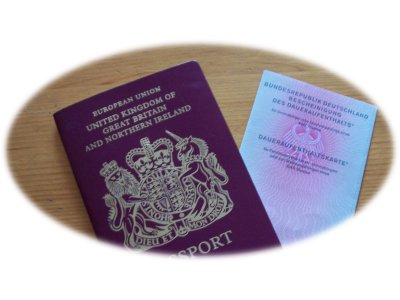 I have to admit, that I didn’t follow the news about the referendum on the UK’s membership of the European Union too much at first. At least, not what the Remain and Leave camps where going on about. I was more interested in the legal attempt to open up the vote to British citizens who had left the country more than 15 years ago and still lived in the EU. Unfortunately, that attempt was not successful and so I, like many others, did not have a vote to cast in the referendum last week.
I have to admit, that I didn’t follow the news about the referendum on the UK’s membership of the European Union too much at first. At least, not what the Remain and Leave camps where going on about. I was more interested in the legal attempt to open up the vote to British citizens who had left the country more than 15 years ago and still lived in the EU. Unfortunately, that attempt was not successful and so I, like many others, did not have a vote to cast in the referendum last week.
Living out of the country for more than 15 years may appear to mean a “weakening of ties with the United Kingdom”, but it doesn’t stop us being directly affected by the outcome of the vote, just as the citizens of other EU countries living in the UK are. And yet they, too, did not get to have their say. However those living for, say, 14 years in Australia did have the right to take part, although they can hardly be so affected by the EU relationship as someone living there.
Although that said, it appears that a large number of British voters in Germany had trouble getting their postal vote anyway.
Anyway, a couple of weeks before the referendum I started getting asked for my opinion. I started reading what the two sides were saying around this time, but my opinion was pretty well made up. Anything other than a vote for “Remain” would create problems for myself and others living outside the country.
I could come up with all sorts of examples, such as why I can work so easily in Germany: I don’t require a work permit. Or why the UK can trade so easily with EU countries at the moment: there are all sorts of agreements in place to make it easier to sell cross-border, such as the reverse charge VAT system. I could also name some pretty mundane things, such as being able to go on holiday without restrictions on currency, or having to worry about emergency health care, or not having to worry about roaming charges in the future.
Sure, you can name countries like Switzerland and Norway that enjoy good relations with the EU, but there are always limits. Try taking a smartphone into Switzerland and you’ll soon discover whether your provider considers your data usage to be within the EU! And there are some annoying EU regulations as well that I sometimes have to deal with, but usually they are still less annoying that the bilateral rules that they replaced.
So, although I could not vote, I made no secret of the fact that I would want the UK to remain in the EU.
After the polling stations had closed, I watched the results programme (which for once was being streamed online without restrictions on where you could watch it) and saw the result from Gibraltar come in. That result may have not been so surprising, neither were any of the interviews at that time with people at the table on Nigel Farage at his party “not conceding defeat” but also saying that he not give up if he lost the vote.
So when I woke up on Friday morning, the result came as a shock.
What would this mean?
Well, we now know how much the promises of the Leave campaign were worth, even if those responsible can’t agree on who said what and some of them won’t even stand up and deliver on them. They even disappeared off the Leave website this week. But can you believe that people were on air saying that they didn’t think their votes would count? Or that they only started to search on-line what it all meant, after they had voted?
It didn’t take long for the phone to ring (metaphorically speaking, these days I am more likely to get a message on Facebook or WhatsApp) to ask for an interview with one of the larger newspapers. I actually gave my interview by phone whilst travelling in the train, and there I was on Saturday: my opinion on Brexit in print.
But whilst the UK political arena descends into chaos, with both major parties fighting over who is to lead them and when to activate the exit clause in the Lisbon treaty, Nigel Farage is off making fun of other MEPs and the head of the European Commission is basically saying “get on with it”, it is frightening to hear what is going on in some parts of the country with people using the result as an excuse to have a go at anyone with foreign roots.
So the real question is now, how does this affect me an other British ex-pats living in the EU, Germany in particular.
Let’s assume for a moment that by the end of the summer, the Conservative party manage to find a new leader who invokes article 50. What then? Or perhaps more accurately, what happens two years later?
Living in Germany
If the UK Government is not able to guarantee EU citizens in the country will retain their rights, why should the other EU countries protect the rights of UK citizens? They would be pretty daft to throw us out as long as we are paying our taxes, but we may have to apply for work permits as non-EU citizens. I currently have unlimited residency in Germany. Will I be able to keep that status?
Elections
At the moment we can vote in local elections (Kommunalwahl, Kreistag) and European Elections. Non-EU citizens can only vote for the Ausländerbeirat. Not a thrilling prospect.
Health care
Since everyone pays for their own healthcare anyway, for normal needs that would not make a difference. But what would happen when we visit the UK? Will our visitors from the UK need private health insurance when they visit us?
Pensions
If you leave the UK to move to a non-EU country, your pension is effectively frozen at the time you leave. Thanks to an agreement within the EU, pensioners here have their pensions adjusted each year, pretty much as if they were still resident in the UK. Will pensions be frozen on the day the UK leaves the EU? Luckily this is something that does not affect me much, having paid into German pension schemes for most of my working life. The German pensions agency have told me that they will continue to recognise the reciprocal agreement with the UK in principle, but that it is the rule that is in force on the day I become eligible for a German state pension that will apply in the end.
Driving
Before 1996, anyone moving to Germany had to exchange their driving license for a German one within one year of taking up residence. I managed to avoid doing this as a student by only staying for exactly a year, and after that the new rule applied anyway. Except that two years ago a new rule came in, restricting the length of time a document can be valid for. So although my UK driving license says that it is valid until 2042, by 2033 at the latest it would need replacing. But there is another problem: the license may be valid in Germany, but the German licensing authorities know nothing about it and cannot help if it gets lost or stolen. Meanwhile DVLA in Swansea will not issue you with a new one if you live outside the UK. Apparently there is a complex way of asking DVLA for a document to confirm your entitlements, having this sent to the UK address, forwarded to Germany, and then the German authorities will issue you with a license.
But how long can I drive on my British license for after the UK leaves the EU? A further year? Or will I be expected to exchange it by that date, since it will be known two years in advance anyway?
I’m not taking any chances, and whilst I thought it was nice not having to exchange the license back in 1996, I have always lived with the problem of what would happen if I ever needed to replace my it. So one of the first things I did after the result came out on Friday was to prepare to exchange my driving license as soon as possible. This week I submitted the application, losing my entitlements to drive C1E, D1, D1E and a variety of other classes of vehicle at the same time.
It’s one problem less to deal with, now to solve the others before someone like Boris Johnson solves them for me!





Speak Your Mind